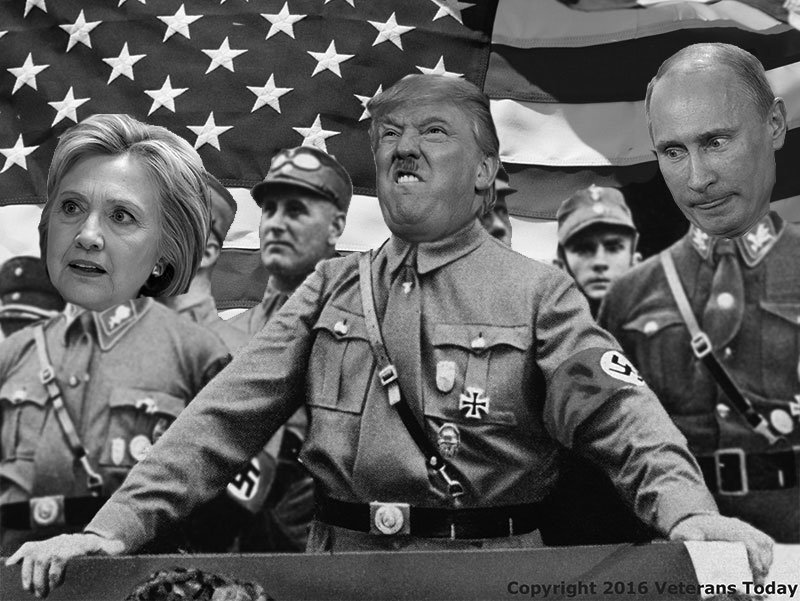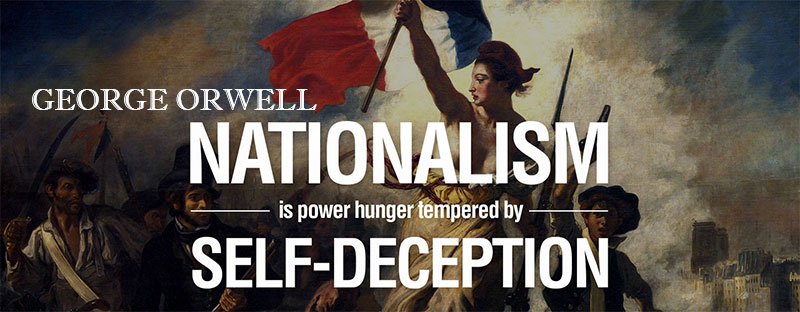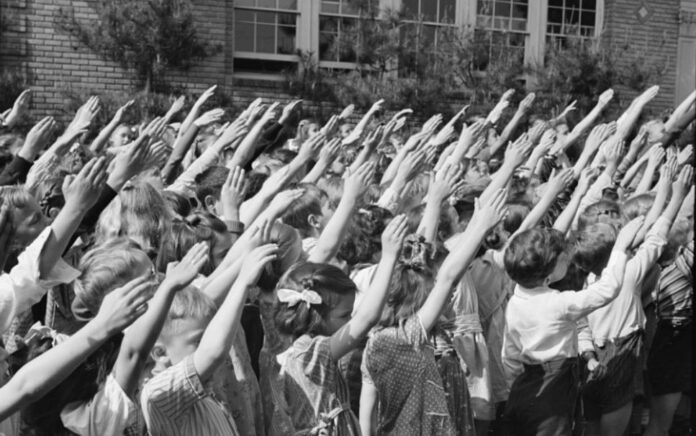Einstein said “Nationalism is an infantile disease. It is the measles of mankind.”
GO USA! GO MEXICO! GO GERMANY or CANADA! GO CHINA! GO RUSSIA! Where does it end?
The Battle Royal for who controls our future is being waged at the highest levels; so high that we can barely see the smoke from their global elitist hyperspace engines. Each day, we watch the daily news as if we can change our future. But here at ground level, we cannot. We are NOT in charge.
The small number of humans that are running this show are arm wrestling one another to see which of them gets to sit at the very top of the globalized pyramid while we get to see their distraction game daily played against us on the corporate propaganda channels.
So we silly fools buy in and spend our time bickering among our lowly selves calling for walls, borders, hate, racism blah blah blah playing the nationalism game while they spread their controlling globalism with impunity around the world under our ignorant noses.
Come on! Who are we kidding here? We will be chipped by the end of the century and you know it! Total and complete control is coming fast. Will their version of globalism win the day or can humanity retain some semblance of freedom and free will for itself?
The Limitations of Nationalism
Our weak unenlightened lack of empathy towards others points to a great challenge for all of us on planet Earth in that most in the world only have empathy as far as they can see. So they stand with their family, their cousins, their city, their country, and even their nation. This is the limitation of nationalism.
In 2024, there are still relatively few of us who reach out passed our nations and consider the global tribe. That’s very normal. But the connections being made via technologies are very new; less than 25 years old. We need more time. And time is on the side of connections growing.
Expanding past Nationalism and uniting humanity is our greatest global challenge this century; not only in the USA but around the world. Technologies are empowering this massive move towards connections.
Around the world, we are seeing the growing pains of this emerging new world. Of course, resistance is everywhere as evolution continues to move itself forward over the obstacles but the great trend is much greater and setting us up for a complete end to nationalism as we know it by the end of our 21st century.

HISTORY and PHILOSOPHY OF NATIONALISM
With the emergence of a national public sphere and an integrated, country-wide economy in 18th-century England, English people began to identify with the country at large, rather than the smaller units of their family, town, or province. The early emergence of popular patriotic nationalism took place in the mid-18th century and was actively promoted by the British government and by the writers and intellectuals of the time.
National symbols, anthems, myths, flags, and narratives were assiduously constructed and adopted. The Union Flag was adopted as a national one; Thomas Arne composed the patriotic song “Rule, Britannia!” in 1740, and the cartoonist John Arbuthnot invented the character of John Bull as the personification of the English national spirit in 1712.
The political convulsions of the late 18th century associated with the American and French revolutions massively augmented the widespread appeal of patriotic nationalism. Ultra-nationalist parties sprung up in France during its revolution.
The Prussian-born Johann Gottfried Herder (1744–1803), the prophet of a form of this new creed, originated the term nationalism.

Herder gave Germans new pride in their origins and proclaimed a national message within the sphere of language, which he believed determines national thought and culture. He attached exceptional importance to the concepts of nationality and of patriotism – “he that has lost his patriotic spirit has lost himself and the whole worlds about himself”, whilst teaching that “in a certain sense every human perfection is national”.
The political development of nationalism and the push for popular sovereignty culminated with the ethnic/national revolutions of Europe, for instance, the Greek War of Independence of 1821–1829. Since that time, nationalism has become one of the most significant political and social forces in history; it was a major influence on or postulate of World War I and World War II.
Concepts of nationalism have spread through widespread literacy, education, and communication technologies: Benedict Anderson argued that “Print language is what invents nationalism, not a particular language per se”.
Two major bodies of thought address the causes of nationalism:
- the modernist perspective describes nationalism as a recent phenomenon that requires the structural conditions of modern society in order to exist
- the primordialist perspective describes nationalism as a reflection of the ancient evolutionary tendency of humans to organize into distinct groupings based on an affinity of birth
Roger Masters in The Nature of Politics (1989) says that both the primordialist and modernist conceptions of nationalism involve an acceptance of three levels of common interest of individuals or groups in national identity
- at an inter-group level, humans respond to competition or conflict by organizing into groups to either attack other groups or defend their group from hostile groups
- at the intra-group level, individuals gain an advantage through cooperation with others in securing collective goods that are not accessible through individual effort alone
- on the individual level, self-interested concerns over personal fitness by individuals either consciously or subconsciously motivate the creation of group formation as a means of security
 The behavior of leadership groups or elites that involve efforts to advance their fitness when they are involved in the mobilization of an ethnic or national group is crucial in the development of the culture of that group.
The behavior of leadership groups or elites that involve efforts to advance their fitness when they are involved in the mobilization of an ethnic or national group is crucial in the development of the culture of that group.

CRITICISM
Critics of nationalism have argued that it is often unclear what constitutes a “nation”, or why a nation should be the only legitimate unit of political rule. A nation is best viewed as a cultural entity and not a political association, nor as necessarily linked to a particular territorial area. But nationalists hold the opposite as self-evident: that the boundaries of a nation and a state should, as far as possible, coincide with only one culture within its boundaries; multi-culturalism is one of their first targets.
Philosopher A.C. Grayling describes nations as artificial constructs, “their boundaries drawn in the blood of past wars”. He argues that “there is no country on earth which is not home to more than one different but usually coexisting culture. Cultural heritage is not the same thing as national identity”.
Nationalism is inherently divisive because it highlights perceived differences between people, emphasizing an individual’s identification with their nation. The idea is also potentially oppressive because it submerges individual identity within a national whole, and gives elites or political leaders potential opportunities to manipulate or control the masses.
Much of the early opposition to nationalism was related to its geopolitical ideal of a separate state for every nation. The classic nationalist movements of the 19th century rejected the very existence of the multi-ethnic empires in Europe. Even in that early stage, however, there was an ideological critique of nationalism. That has developed into several forms of anti-nationalism in the Western world. The Islamic revival of the 20th century also produced an Islamic critique of the nation-state.
At the end of the 19th century, Marxists and other socialists (such as Rosa Luxemburg) produced political analyses that were critical of the nationalist movements then active in central and eastern Europe (though a variety of other contemporary socialists and communists, from Lenin (a communist) to Józef Piłsudski (a socialist), were more sympathetic to national self-determination).
In his classic essay on the topic, George Orwell distinguishes nationalism from patriotism, which he defines as devotion to a particular place. Nationalism, more abstractly, is “power-hunger tempered by self-deception.”

For Orwell, the nationalist is more likely than not dominated by irrational negative impulses:
There are, for example, Trotskyists who have become simply enemies of the U.S.S.R. without developing a corresponding loyalty to any other unit. When one grasps the implications of this, the nature of what I mean by nationalism becomes a good deal clearer.
A nationalist thinks solely, or mainly, in terms of competitive prestige. He may be a positive or a negative nationalist—that is, he may use his mental energy either in boosting or in denigrating—but at any rate his thoughts always turn on victories, defeats, triumphs, and humiliations. He sees history, especially contemporary history, as the endless rise and decline of great power units and every event that happens seems to him a demonstration that his side is on the upgrade and some hated rival is on the downgrade.
But finally, it is important not to confuse nationalism with mere worship of success. The nationalist does not go on the principle of simply ganging up with the strongest side. On the contrary, having picked his side, he persuades himself that it is the strongest and can stick to his belief even when the facts are overwhelmingly against him.
In the liberal political tradition, there is widespread criticism of ‘nationalism’ as a dangerous force and a cause of conflict and war between nation-states. Nationalism has often been exploited to encourage citizens to partake in the nation’s conflicts. Such examples include the two World Wars, where nationalism was a key component of propaganda material. Liberals do not generally dispute the existence of nation-states, although some liberal critiques do emphasize individual freedom as opposed to national identity, which is by definition collective.
The pacifist critique of nationalism also concentrates on the violence of nationalist movements, the associated militarism, and conflicts between nations inspired by jingoism or chauvinism. National symbols and patriotic assertiveness are in some countries discredited by their historical link with past wars, especially in Germany. Famous pacifist Bertrand Russell criticizes nationalism for diminishing the individual’s capacity to judge his or her fatherland’s foreign policy.

THE END IS NEAR
In England 2016, we saw a Brexit movement resisting the global connections given to us by evolution and the technologies that allow us to get connected to our fellow man around the world. They are backtracking; insulating themselves from the future in hopes of preserving the past. It’s a noble effort. Unfortunately, it’s futile.
What is clear is the young found Brexit to be foolish. They were outvoted by the older electorates who yearned for yesteryear.
We see the same phenomenon in the U.S.A. with the rise of Donald Trump. His supporters are running scared fearing the future. He has them running from everything under the sun and yearning for yesteryear.
Trump leans towards isolationism; a white-only world where building walls will save them from the future. But like England, the youth in the USA overwhelmingly reject Trump’s closing down the country from the outside world ethos and a return to the 1950s. This is telling in that the future is coming whether we stall it or not because the younger generations are already connected. It’s too late!
Brexit can apply the brakes while Trump builds walls but the tidal wave is already in motion and it cannot be put back in the bag. The best that living in fear can do is slow it down. But in the end, the wave will dominate us all. It’s simply too late. The technologies that connect us are only going to get faster, stronger, and more empowering.
So no matter what side of the issue you’re on, it does not matter. What matters is the energy of the universe is converging like never before in our human existence. Evolution is calling and Nationalism is using a rotary dial phone! Oops! It’s both exciting and scary, right?
Now I know some of you are going to post that this is just another article by George Soros and I am a shill for the New World Order but that would be a cop out. Come on….please stay focused on here!
While I advocate for being proud of your family, your clan, your city, your state, and your nation, I strongly believe that when we pledge allegiance to the earth and every human being on it, then we have a real chance to realize the potential of humanity.
I believe we humans can make it great and work for us. But it’s not going to be easy right? I mean, there are greedy heartless enterprises and people with power that have a different vision of the New World Order that has NO regard for humanity so……..
I mean we all know this happening. The real questions are;
- How is it going to happen?
- Is it going to be a dictatorial one-world government or something else?
- Will it be a government by the people for the people?
- Will it be the same monetary resource-based economy that drives it or will it be something like a resource-based economy described by 20th century philosopher Jacque Fresco and his Venus Project?
We don’t know yet. But the end of nationalism is coming by the end of this century. Now what?

Coach J.P. Money is the founder of Coach J.P. Money. He is an expert in Coaching and Money! He is also a writer, global citizen eco-activist, visionary, musician, artist, entertainer, businessman, investor, life coach, and syndicated columnist. He is also known as the music artist “Johnny Punish”; a name given to him by a bandmate during his Punk Rock years fronting the rogue underground punk band “Twisted Nixon”
His Expat home base since the late 1990s is Mexico. J.P. Money, aka Charles Bivona Jr., was educated at the University of Nevada Las Vegas (1980-81) and California State University Fullerton (1981-1984) with studies in accounting, finance and business. He bought is first real estate income property at 17 years old with no money down. He has been debt-free and building wealth since 1998.
Before the “internets” had been invented, he also owned and ran (5) national newspapers in the United States of America from 1987-1998. In addition, he created and ran the important online media sites; HireVeterans.com (2004-2020) and VT Foreign Policy (2004-2023).
J.P. Money is married to Queen Albertina from Sinaloa Mexico (1985). Together they have 3 adult children and 7 grandkids. They live in Baja Mexico at the home they built together out of plastic bags and dirt (Super Adobe). Now they share their epic artistic piece with the world as a unique luxury BnB called “Hacienda Eco-Domes“.
Read J.P. Money’s Full Bio at PunishStudios.com >>>












